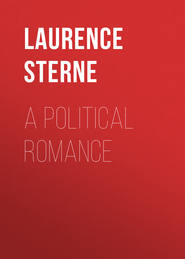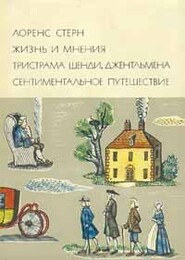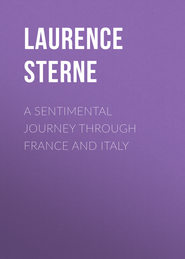По всем вопросам обращайтесь на: info@litportal.ru
(©) 2003-2025.
✖
The Life and Opinions of Tristram Shandy, Gentleman
Настройки чтения
Размер шрифта
Высота строк
Поля
The Epitasis, wherein the action is more fully entered upon and heightened, till it arrives at its state or height called the Catastasis, and which usually takes up the 2d and 3d act, is included within that busy period of my tale, betwixt the first night's uproar about the nose, to the conclusion of the trumpeter's wife's lectures upon it in the middle of the grand parade: and from the first embarking of the learned in the dispute—to the doctors finally sailing away, and leaving the Strasburgers upon the beach in distress, is the Catastasis or the ripening of the incidents and passions for their bursting forth in the fifth act.
This commences with the setting out of the Strasburgers in the Frankfort road, and terminates in unwinding the labyrinth and bringing the hero out of a state of agitation (as Aristotle calls it) to a state of rest and quietness.
This, says Hafen Slawkenbergius, constitutes the Catastrophe or Peripeitia of my tale—and that is the part of it I am going to relate.
We left the stranger behind the curtain asleep—he enters now upon the stage.
–What dost thou prick up thy ears at?—'tis nothing but a man upon a horse—was the last word the stranger uttered to his mule. It was not proper then to tell the reader, that the mule took his master's word for it; and without any more ifs or ands, let the traveller and his horse pass by.
The traveller was hastening with all diligence to get to Strasburg that night. What a fool am I, said the traveller to himself, when he had rode about a league farther, to think of getting into Strasburg this night.—Strasburg!—the great Strasburg!—Strasburg, the capital of all Alsatia! Strasburg, an imperial city! Strasburg, a sovereign state! Strasburg, garrisoned with five thousand of the best troops in all the world!—Alas! if I was at the gates of Strasburg this moment, I could not gain admittance into it for a ducat—nay a ducat and half—'tis too much—better go back to the last inn I have passed—than lie I know not where—or give I know not what. The traveller, as he made these reflections in his mind, turned his horse's head about, and three minutes after the stranger had been conducted into his chamber, he arrived at the same inn.
–We have bacon in the house, said the host, and bread—and till eleven o'clock this night had three eggs in it—but a stranger, who arrived an hour ago, has had them dressed into an omelet, and we have nothing.—
Alas! said the traveller, harassed as I am, I want nothing but a bed.—I have one as soft as is in Alsatia, said the host.
–The stranger, continued he, should have slept in it, for 'tis my best bed, but upon the score of his nose.—He has got a defluxion, said the traveller.—Not that I know, cried the host.—But 'tis a camp-bed, and Jacinta, said he, looking towards the maid, imagined there was not room in it to turn his nose in.—Why so? cried the traveller, starting back.—It is so long a nose, replied the host.—The traveller fixed his eyes upon Jacinta, then upon the ground—kneeled upon his right knee—had just got his hand laid upon his breast—Trifle not with my anxiety, said he rising up again.—'Tis no trifle, said Jacinta, 'tis the most glorious nose!—The traveller fell upon his knee again—laid his hand upon his breast—then, said he, looking up to heaven, thou hast conducted me to the end of my pilgrimage—'Tis Diego.
The traveller was the brother of the Julia, so often invoked that night by the stranger as he rode from Strasburg upon his mule; and was come, on her part, in quest of him. He had accompanied his sister from Valadolid across the Pyrenean mountains through France, and had many an entangled skein to wind off in pursuit of him through the many meanders and abrupt turnings of a lover's thorny tracks.
–Julia had sunk under it—and had not been able to go a step farther than to Lyons, where, with the many disquietudes of a tender heart, which all talk of—but few feel—she sicken'd, but had just strength to write a letter to Diego; and having conjured her brother never to see her face till he had found him out, and put the letter into his hands, Julia took to her bed.
Fernandez (for that was her brother's name)—tho' the camp-bed was as soft as any one in Alsace, yet he could not shut his eyes in it.—As soon as it was day he rose, and hearing Diego was risen too, he entered his chamber, and discharged his sister's commission.
The letter was as follows:
'Seig. Diego,
'Whether my suspicions of your nose were justly excited or not—'tis not now to inquire—it is enough I have not had firmness to put them to farther tryal.
'How could I know so little of myself, when I sent my Duenna to forbid your coming more under my lattice? or how could I know so little of you, Diego, as to imagine you would not have staid one day in Valadolid to have given ease to my doubts?—Was I to be abandoned, Diego, because I was deceived? or was it kind to take me at my word, whether my suspicions were just or no, and leave me, as you did, a prey to much uncertainty and sorrow?
'In what manner Julia has resented this—my brother, when he puts this letter into your hands, will tell you; He will tell you in how few moments she repented of the rash message she had sent you—in what frantic haste she flew to her lattice, and how many days and nights together she leaned immoveably upon her elbow, looking through it towards the way which Diego was wont to come.
'He will tell you, when she heard of your departure—how her spirits deserted her—how her heart sicken'd—how piteously she mourned—how low she hung her head. O Diego! how many weary steps has my brother's pity led me by the hand languishing to trace out yours; how far has desire carried me beyond strength—and how oft have I fainted by the way, and sunk into his arms, with only power to cry out—O my Diego!
'If the gentleness of your carriage has not belied your heart, you will fly to me, almost as fast as you fled from me—haste as you will—you will arrive but to see me expire.—'Tis a bitter draught, Diego, but oh! 'tis embittered still more by dying un…—'
She could proceed no farther.
Slawkenbergius supposes the word intended was unconvinced, but her strength would not enable her to finish her letter.
The heart of the courteous Diego over-flowed as he read the letter—he ordered his mule forthwith and Fernandez's horse to be saddled; and as no vent in prose is equal to that of poetry in such conflicts—chance, which as often directs us to remedies as to diseases, having thrown a piece of charcoal into the window—Diego availed himself of it, and whilst the hostler was getting ready his mule, he eased his mind against the wall as follows.
Ode.
Harsh and untuneful are the notes of love,
Unless my Julia strikes the key,
Her hand alone can touch the part,
Whose dulcet movement charms the heart,
And governs all the man with sympathetick sway.
2d.
O Julia!
The lines were very natural—for they were nothing at all to the purpose, says Slawkenbergius, and 'tis a pity there were no more of them; but whether it was that Seig. Diego was slow in composing verses—or the hostler quick in saddling mules—is not averred; certain it was, that Diego's mule and Fernandez's horse were ready at the door of the inn, before Diego was ready for his second stanza; so without staying to finish his ode, they both mounted, sallied forth, passed the Rhine, traversed Alsace, shaped their course towards Lyons, and before the Strasburgers and the abbess of Quedlingberg had set out on their cavalcade, had Fernandez, Diego, and his Julia, crossed the Pyrenean mountains, and got safe to Valadolid.
'Tis needless to inform the geographical reader, that when Diego was in Spain, it was not possible to meet the courteous stranger in the Frankfort road; it is enough to say, that of all restless desires, curiosity being the strongest—the Strasburgers felt the full force of it; and that for three days and nights they were tossed to and fro in the Frankfort road, with the tempestuous fury of this passion, before they could submit to return home.—When alas! an event was prepared for them, of all other, the most grievous that could befal a free people.
As this revolution of the Strasburgers affairs is often spoken of, and little understood, I will, in ten words, says Slawkenbergius, give the world an explanation of it, and with it put an end to my tale.
Every body knows of the grand system of Universal Monarchy, wrote by order of Mons. Colbert, and put in manuscript into the hands of Lewis the fourteenth, in the year 1664.
'Tis as well known, that one branch out of many of that system, was the getting possession of Strasburg, to favour an entrance at all times into Suabia, in order to disturb the quiet of Germany—and that in consequence of this plan, Strasburg unhappily fell at length into their hands.
It is the lot of a few to trace out the true springs of this and such like revolutions—The vulgar look too high for them—Statesmen look too low—Truth (for once) lies in the middle.
What a fatal thing is the popular pride of a free city! cries one historian—The Strasburgers deemed it a diminution of their freedom to receive an imperial garrison—so fell a prey to a French one.
The fate, says another, of the Strasburgers, may be a warning to all free people to save their money.—They anticipated their revenues—brought themselves under taxes, exhausted their strength, and in the end became so weak a people, they had not strength to keep their gates shut, and so the French pushed them open.
Alas! alas! cries Slawkenbergius, 'twas not the French,—'twas Curiosity pushed them open—The French indeed, who are ever upon the catch, when they saw the Strasburgers, men, women and children, all marched out to follow the stranger's nose—each man followed his own, and marched in.
Trade and manufactures have decayed and gradually grown down ever since—but not from any cause which commercial heads have assigned; for it is owing to this only, that Noses have ever so run in their heads, that the Strasburgers could not follow their business.
Alas! alas! cries Slawkenbergius, making an exclamation—it is not the first—and I fear will not be the last fortress that has been either won—or lost by Noses.
The End of Slawkenbergius's Tale.
Chapter 2.XXXVI
With all this learning upon Noses running perpetually in my father's fancy—with so many family prejudices—and ten decades of such tales running on for ever along with them—how was it possible with such exquisite—was it a true nose?—That a man with such exquisite feelings as my father had, could bear the shock at all below stairs—or indeed above stairs, in any other posture, but the very posture I have described?
–Throw yourself down upon the bed, a dozen times—taking care only to place a looking-glass first in a chair on one side of it, before you do it—But was the stranger's nose a true nose, or was it a false one?
To tell that before-hand, madam, would be to do injury to one of the best tales in the Christian-world; and that is the tenth of the tenth decade, which immediately follows this.
This tale, cried Slawkenbergius, somewhat exultingly, has been reserved by me for the concluding tale of my whole work; knowing right well, that when I shall have told it, and my reader shall have read it thro'—'twould be even high time for both of us to shut up the book; inasmuch, continues Slawkenbergius, as I know of no tale which could possibly ever go down after it.
'Tis a tale indeed!
This sets out with the first interview in the inn at Lyons, when Fernandez left the courteous stranger and his sister Julia alone in her chamber, and is over-written.
The Intricacies of Diego and Julia.
Heavens! thou art a strange creature, Slawkenbergius! what a whimsical view of the involutions of the heart of woman hast thou opened! how this can ever be translated, and yet if this specimen of Slawkenbergius's tales, and the exquisitiveness of his moral, should please the world—translated shall a couple of volumes be.—Else, how this can ever be translated into good English, I have no sort of conception—There seems in some passages to want a sixth sense to do it rightly.—What can he mean by the lambent pupilability of slow, low, dry chat, five notes below the natural tone—which you know, madam, is little more than a whisper? The moment I pronounced the words, I could perceive an attempt towards a vibration in the strings, about the region of the heart.—The brain made no acknowledgment.—There's often no good understanding betwixt 'em—I felt as if I understood it.—I had no ideas.—The movement could not be without cause.—I'm lost. I can make nothing of it—unless, may it please your worships, the voice, in that case being little more than a whisper, unavoidably forces the eyes to approach not only within six inches of each other—but to look into the pupils—is not that dangerous?—But it can't be avoided—for to look up to the cieling, in that case the two chins unavoidably meet—and to look down into each other's lap, the foreheads come to immediate contact, which at once puts an end to the conference—I mean to the sentimental part of it.—What is left, madam, is not worth stooping for.
Chapter 2.XXXVII











